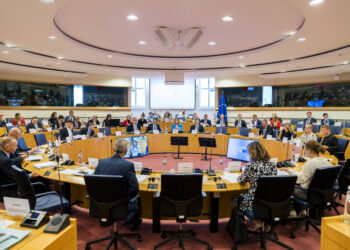Brussels – The process of approving the commissioners-designate by the Europarliament finally began this morning (October 3), with the legal committee (JURI)‘s examination by the hemicycle of the self-declarations of financial interests of the 26 candidates to make up the new EU executive. But it did not go very well: only three, out of all of them, were “promoted” by MEPs. According to the representatives of the Left, the self-declarations would be scarce and sketchy, and the whole process would be anything but neutral or transparent.
The process that will lead to the final promotion (or rejection) of the members of the new College opened with the deposit of self-declarations of financial interests of the commissioners-designate to the House Judiciary Committee, which will now have to carefully analyze the information at its disposal and assess possible conflicts of interest, which could prevent candidates from moving on to the following stages of selection, namely the confirmation hearings (set just yesterday for week of Nov. 4–12).
It wasn’t exactly a smooth first day. According to parliamentary sources, out of 26 self-declarations examined by JURI’s MEPs (which will be made public only at the end of the examination in question), only three “passed” at the first shot (those of Dutch Wopke Hoekstra, Poland’s Piotr Serafin and Hungary’s Olivér Várhelyi). At the same time, ten were returned to the senders, who must produce supplementary documents by October 10. By that date, the Conference of Presidents (CoP, i.e., the body that brings together the chair and group leaders of the political forces in the hemicycle) will have written questions on paper, which the commissioner candidates must answer by October 22. For the remaining 13 self-declarations, additional information and a new compilation of the documents in question have been requested.
According to the co-leader of The Left, French Manon Aubry, among the “problematic” candidates from the point of view of potential conflicts of interest would be Italian Raffaele Fitto, Portuguese Maria Luís Albuquerque and Slovenian Marta Kos. On the Rome-appointed commissioner, the doubts would relate to real estate holdings and “court cases not all closed.” The Portuguese (who will be in charge of Financial Services) has worked for Morgan Stanley in the past, and the Slovenian (to whom the Enlargement portfolio should go) for Kreab, a consulting firm that handles clients of the calibre of Amazon and Google. Doubts would also remain about Hoekstra, proposed for the climate and taxation dossiers, related to his past in Shell and his involvement in the Panama papers investigation.
“Do you think they are the worthy representatives of the European people or of a few lobbies and companies?” the leader elected with La France insoumise asked sarcastically, speaking to reporters in the Brussels headquarters of the Euro Parliament. According to Aubry, “the biggest problems are not addressed by the procedure” followed in JURI, where “we only look at declared financial assets, but we don’t look at what the commissioner candidates have done and who they have worked for in the past.”
The radical left fired back at the entire conflict of interest vetting process conducted in JURI, which “is profoundly flawed and politicized and fails to take into account the complexities of potential conflicts of interest.” “A total farce” with insufficient timelines for proper vetting, which takes place “behind closed doors” instead of being public.
The review “is now limited only to Parts III and IV of the declaration of interests provided by the commissioners, unlike the process in vogue in 2019, which covered the entire declaration,” reads a group statement. The two sections in question cover personal financial interests and those of spouses, partners, and minor children; thus, the note continues, other potentially problematic situations such as investments in companies or consulting roles cannot be examined. In short, the Law Commission “lacks the necessary tools to conduct an effective review, relying only on the self-declarations of the appointed commissioners, without the ability to verify the accuracy or completeness of this information.”
This, as pointed out by 5 Star Movement MEP Mario Furore (member of JURI), creates a basic impediment because “with a very little or empty financial declaration,” the legal committee has a hard time “then asking what, if any, conflicts of interest there are.” “Many commissioners, for example, have worked in multinational corporations and large companies and have not even declared the clients they have worked with over the years that might conflict with their portfolios if these people were to become commissioners,” he said, while other candidates “have family businesses that might even enter or operate with the portfolios themselves.” “The transparency so extolled by Ursula von der Leyen has not been there,” the M5S MP concluded.
To rebalance Parliament’s evaluation process, the Left has called for more comprehensive and detailed financial statements that are public and accessible (especially to the media and nongovernmental organizations), a longer period of “pause” between the end of private-sector positions and the beginning of public roles in the EU executive (to avoid so-called “revolving doors”), and the introduction of a full-fledged EU ethics watchdog to oversee conflict-of-interest situations for EU officials.
English version by the Translation Service of Withub




